There’s an unmistakable tension that creeps up the base of your skull, settling like a vice around the nape of your neck. It’s not just a physical sensation; it carries with it a weight, a constant unease. You’ve felt it on those nights when sleep evades you, or during those long days at the desk. Could it be that the stress and anxiety you’re grappling with have found a way to manifest in your neck? The connection between anxiety and neck pain is more intertwined than you might think, and understanding this link is the first step to unraveling it. Dive in with us as we explore this connection and offer you tangible solutions to alleviate the double bind of mental strain and physical discomfort.
Contents
Does Anxiety Cause Neck Pain?
The short answer is, yes, anxiety can lead to neck pain. But the relationship between the two is complex, and understanding it requires a deeper look at how our bodies respond to stress and anxiety.
Body’s Stress Response
When we experience anxiety or stress, our body goes into a “fight or flight” mode. This is an evolutionary response designed to prepare us to either confront or flee from perceived threats. During this reaction, the body releases stress hormones like cortisol and adrenaline. These hormones increase our heart rate, sharpen our senses, and prepare our muscles for quick action. One consequence of this heightened state is the tensing of muscles, including those in the neck and shoulders.
Chronic Tension
For many of us, the “threats” we face today are not predators, but persistent stressors like work pressures, financial worries, or relationship challenges. When anxiety becomes chronic, so does the muscle tension. Over time, continuously tensed muscles can lead to discomfort, pain, and even muscle knots in the neck and shoulder region.
Postural Impact
Anxiety can also influence our posture. When anxious, people might hunch over, drop their head, or adopt other protective postures. Such sustained postures can strain the neck muscles and spinal structures, contributing to pain.
Feedback Loop
Neck pain, in turn, can exacerbate feelings of anxiety. Those suffering from chronic neck pain might become more anxious about their health or the inability to perform certain tasks, thus feeding into a vicious cycle.
Additional Factors
It’s also worth noting that while anxiety can cause neck pain, there are often other contributing factors. Existing neck issues, poor ergonomics, physical injuries, or other medical conditions can also play a role.
In essence, while anxiety can be a significant contributor to neck pain, it’s just one piece of the puzzle. Addressing anxiety-driven neck pain often requires a multifaceted approach, tackling both the mental and physical aspects of the issue.
The Vicious Cycle: Pain Increases Anxiety
 Picking up from where we left off, the interplay between anxiety and neck pain is not just one-directional. While we’ve explored how anxiety can be a precursor to neck pain, the feedback loop, unfortunately, doesn’t end there. This cycle, where pain accentuates anxiety and vice versa, is a challenging and often self-sustaining loop.
Picking up from where we left off, the interplay between anxiety and neck pain is not just one-directional. While we’ve explored how anxiety can be a precursor to neck pain, the feedback loop, unfortunately, doesn’t end there. This cycle, where pain accentuates anxiety and vice versa, is a challenging and often self-sustaining loop.
Pain as a Stressor: To begin with, any form of chronic pain, including neck pain, is inherently stressful. It disrupts our daily activities, sleep patterns, and overall quality of life. When we’re constantly reminded of a nagging pain, it becomes a source of worry. Questions like “Why isn’t this pain going away?” or “Is there a serious underlying condition?” can plague our minds.
- Impact on Daily Life: Chronic neck pain might restrict movement, leading to difficulties in performing everyday tasks. Such limitations can lead to feelings of helplessness or frustration, amplifying anxiety levels.
- Physiological Response: As the pain persists or intensifies, our body might once again release stress hormones, inadvertently tensing up the muscles around the neck and shoulders even more.
- Sleep Disturbances: Neck pain can make finding a comfortable sleeping position challenging.
- Social and Recreational Restrictions: Chronic pain might also limit social interactions or recreational activities. As one begins to pull away from enjoyable activities or social events, feelings of isolation or depression can set in, compounding the initial anxiety.
Breaking this cycle requires a holistic understanding of its interconnected nature. While treatments might target the physical manifestations of pain, addressing the psychological elements of anxiety is equally crucial.
Physical Exercises to Ease Neck Pain
Anxiety-induced neck pain can often be attributed to chronic muscle tension and poor posture. While managing stress and anxiety is crucial, complementing it with specific physical exercises can provide direct relief to the tensed neck muscles. Here’s a guide to some effective exercises and stretches tailored to alleviate neck pain:
Neck Tilt Stretch

- How it Helps: Stretches the muscles along the sides of the neck.
- How to Do It: Sit or stand straight. Slowly tilt your head to one side, bringing your ear towards your shoulder. Hold for 15-30 seconds, then switch to the other side.
Neck Turn Stretch
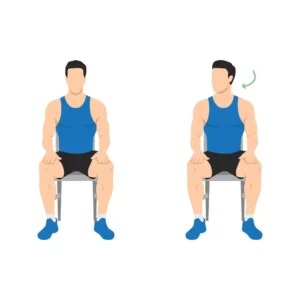
- How it Helps: Increases flexibility and stretches the sides of the neck.
- How to Do It: While maintaining a straight posture, slowly turn your head to one side until you feel a stretch along the side of the neck and shoulder. Hold for 15-30 seconds, then repeat on the other side.
Neck Flexion Stretch

- How it Helps: Stretches the back of the neck.
- How to Do It: Interlace your fingers and place them at the back of your head. Gently push your head down, bringing the chin towards the chest. Hold for 15-30 seconds.
Shoulder Roll
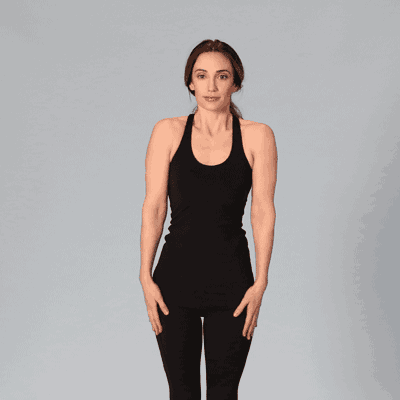
- How it Helps: Relieves tension in the neck and shoulders.
- How to Do It: Sit or stand straight. Slowly roll your shoulders in a circular motion, first forward, then backward. Do this for about 10 times in each direction.
Wall Angel Exercise
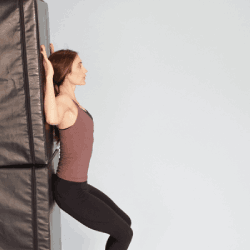
- How it Helps: Strengthens the muscles of the neck, shoulders, and upper back, promoting better posture.
- How to Do It: Stand with your back against a wall, feet hip-width apart. Bring your arms up with elbows bent at 90 degrees, like a ‘goal post.’ Slide your arms up and down the wall for about 10 repetitions.
Chin Tuck Exercise
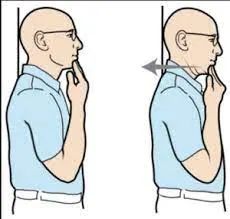
- How it Helps: Strengthens the neck muscles and corrects forward head posture.
- How to Do It: Sit or stand with a straight spine. Tuck your chin in slightly, creating a double chin, and pull your head backward. Hold for 5 seconds and repeat 10 times.
Scapular Squeeze
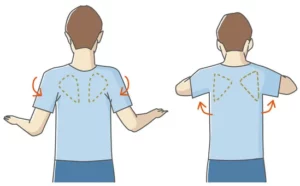
- How it Helps: Strengthens the upper back muscles, supporting the neck.
- How to Do It: Sit or stand straight. Squeeze your shoulder blades together, as if you’re trying to hold a pencil between them. Hold for 5 seconds, then release. Repeat 10 times.
Neck Resistance Exercise

- How it Helps: Builds strength in the neck muscles.
- How to Do It: Place your hand against your forehead. Push your head against your hand without letting it move. Hold for 5 seconds, then switch to the sides and back of the head.
Remember, while these exercises are designed to offer relief, it’s crucial to listen to your body. Always perform exercises and stretches within a comfortable range, and avoid any movements that cause pain. If the pain persists or if you’re unsure about the correct technique, consider consulting a physical therapist or healthcare professional for personalized guidance.
Professional Treatment Options
 While self-help methods and exercises can provide significant relief from anxiety-induced neck pain, in some cases, turning to professionals can offer a more targeted, comprehensive, and long-lasting solution. Here’s an overview of healthcare professionals who specialize in addressing these interconnected issues:
While self-help methods and exercises can provide significant relief from anxiety-induced neck pain, in some cases, turning to professionals can offer a more targeted, comprehensive, and long-lasting solution. Here’s an overview of healthcare professionals who specialize in addressing these interconnected issues:
- Physical Therapists: Physical therapists can assess the underlying causes of your neck pain, provide tailored exercises and stretches, and use manual therapy techniques to relieve tension. They also teach posture correction and ergonomic advice, making daily activities less taxing on your neck.
- Chiropractors: Chiropractic care focuses on the musculoskeletal system, especially the spine. Adjustments can help realign the spine, potentially relieving neck pain. Through spinal manipulations, they aim to reduce pain, improve range of motion, and boost the body’s innate ability to heal itself.
- Psychotherapists: If anxiety is a primary contributor to your neck pain, a psychotherapist can offer coping strategies, cognitive-behavioral therapy, and other therapeutic modalities. They address the root psychological causes of anxiety, helping you understand and manage triggers, develop coping skills, and potentially decrease the physical manifestations of stress.
- Massage Therapists: By applying pressure and manipulating muscles, they can increase blood flow to affected areas, aiding in healing and providing relief from chronic tension.
- Acupuncturists: It’s suggested that acupuncture can stimulate nerves, muscles, and connective tissue, boosting the body’s natural painkillers and promoting relaxation.
It’s essential to note that the best approach may involve a combination of treatments. Consulting your primary care physician first can help direct you to the most appropriate professional for your unique situation. They can provide a holistic view of the situation, ensuring that both the physical and emotional components of your pain are addressed in tandem for the best possible outcome.
Conclusion
Anxiety and neck pain, though seemingly distinct, can intertwine in complex ways, impacting one’s overall quality of life. Addressing them requires a multi-faceted approach, incorporating self-help techniques, exercises, and professional interventions. While many paths can lead to relief, the guidance of a skilled professional can often provide a faster, more effective route to recovery.
If you find yourself burdened by persistent neck pain, remember that you don’t have to navigate the journey alone. At PhysioMantra, our specialized approach to physical therapy for neck pain can offer you the tailored treatment you deserve. Don’t let discomfort dictate your days. Take the first step towards a pain-free life: Book an online physical therapy session with us today.



